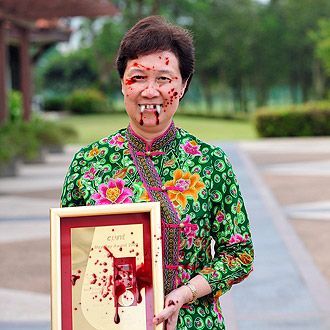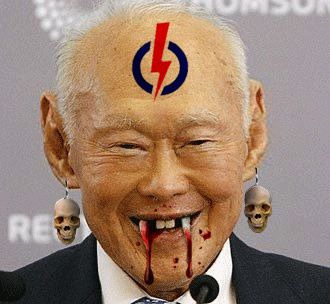http://www.todayonline.com/Singapore/EDC090609-0000056/When-the-kids-dont-pay-up-,,,
When the kids don’t pay up ...
Law needs more ‘teeth’ as unpaid nursing home bills rise, enforcement orders up
05:55 AM Jun 09, 2009
by Leong Wee Keat
THE unpaid bills had amounted to a mere $7,603 in 2007. But as the financial crisis took hold last year, one nursing home found itself saddled with a $111,576 mountain in bad debt - from children who would not, or could not, pay for their elderly folks’ care.
According to All Saints Home chief executive Chan Wah Tiong, two years ago there were fewer than five defaulting cases. Last year, the number about quadrupled: Six were next-of-kin who refused to pay the bill upon their relative’s death, while the majority could not afford to pay due to job losses, pay cuts or illness.
All Saints is not alone. At Ju Eng Home for Senior Citizens, the bad debts doubled to some $60,000 last year. And in just the first five months of this year, more than $40,000 is owed the home, said chairman Lawrence Ang.
As the downturn deepens, evidence suggests that more children are finding it tougher - or less willing - to support their parents.
Figures from the Tribunal for the Maintenance of Parents show new applications filed by the elderly hit a nine-year high last year. Some 127 seniors sued their children for maintenance, up from 109 in 2007 and 79 in 2006.
More seniors also sought to enforce orders against their children through the Family Court: 94 last year, up from 77.
Concerned Members of Parliament have urged the Government to do more, and Dr Vivian Balakrishnan, Minister for Community Development, Youth and Sports, revealed that the 14-year-old Maintenance of Parents Act could soon be given “more teeth”.
One suggestion from social workers: Have the authorities order that maintenance payments be deducted straight from the children’s wages.
While a person who disobeys the tribunal’s order can be jailed for up to six months, family lawyer Anamah Tan - who previously served on the tribunal - thinks that recalcitrant offenders should be slapped with heavy fines instead.
“If you jail the children, you may cut off the family’s livelihood. Hitting the pocket may be the best way,” she argued.
But what if the adult children simply do not have the means to pay?
“If we use the law to punish some, would we drive them to further desperation?” wondered philanthropist Wee Lin, founder of Sunlove Abode for the Intellectually Infirmed which has seen a 10-per-cent increase in bad debts.
Mr Ang suggested that children be allowed to use their CPF Medisave accounts to help pay for their parents’ nursing home fees. “This avoids taking cash away from these financially strapped families,” he said.
Dilemma of burning bridges
While social workers agree with the need for better enforcement of the law, they face a dilemma: Preserving that delicate relationship between parent and child.
While nursing homes can, with the patient’s consent, pursue maintenance claims on his or her behalf, the homes shy away from such recourse.
“There is the emotional stress and strain on the patient to consider,” said Mr Chan.
Two years ago, All Saints Home helped a client claim maintenance payments from her four daughters after her son, who had been supporting her, had a stroke. Family ties were strained. The client’s daughters called the home regularly thereafter - not to check on her, but to quiz the home on her bill and ensure their payments of $100 a piece were really being used
Then, there is the fear among some seniors about bringing “shame” to their children and families by initiating maintenance proceedings, said social worker Alvin Chua. “Some are even fearful that their children will not perform their final rites.”
Mr Chua, who is from voluntary welfare group Safe@Trans, suggested that social workers be given powers to initiate the claim process if there is a real need, without the client’s consent needed.
But this could be controversial as it detracts from the social worker’s mantra of having clients determine their own course of action, he said.
In sum, said Mr Chan, the difficulty in the Maintenance of Parents Act lies in its execution, “given that many elderly may want to save ‘face’. How do we allow them to live with dignity without burning any bridges?”
URL http://www.todayonline.com/Singapore/EDC090609-0000056/When-the-kids-dont-pay-up-,,,
When the kids don’t pay up ...
Law needs more ‘teeth’ as unpaid nursing home bills rise, enforcement orders up
05:55 AM Jun 09, 2009
by Leong Wee Keat
THE unpaid bills had amounted to a mere $7,603 in 2007. But as the financial crisis took hold last year, one nursing home found itself saddled with a $111,576 mountain in bad debt - from children who would not, or could not, pay for their elderly folks’ care.
According to All Saints Home chief executive Chan Wah Tiong, two years ago there were fewer than five defaulting cases. Last year, the number about quadrupled: Six were next-of-kin who refused to pay the bill upon their relative’s death, while the majority could not afford to pay due to job losses, pay cuts or illness.
All Saints is not alone. At Ju Eng Home for Senior Citizens, the bad debts doubled to some $60,000 last year. And in just the first five months of this year, more than $40,000 is owed the home, said chairman Lawrence Ang.
As the downturn deepens, evidence suggests that more children are finding it tougher - or less willing - to support their parents.
Figures from the Tribunal for the Maintenance of Parents show new applications filed by the elderly hit a nine-year high last year. Some 127 seniors sued their children for maintenance, up from 109 in 2007 and 79 in 2006.
More seniors also sought to enforce orders against their children through the Family Court: 94 last year, up from 77.
Concerned Members of Parliament have urged the Government to do more, and Dr Vivian Balakrishnan, Minister for Community Development, Youth and Sports, revealed that the 14-year-old Maintenance of Parents Act could soon be given “more teeth”.
One suggestion from social workers: Have the authorities order that maintenance payments be deducted straight from the children’s wages.
While a person who disobeys the tribunal’s order can be jailed for up to six months, family lawyer Anamah Tan - who previously served on the tribunal - thinks that recalcitrant offenders should be slapped with heavy fines instead.
“If you jail the children, you may cut off the family’s livelihood. Hitting the pocket may be the best way,” she argued.
But what if the adult children simply do not have the means to pay?
“If we use the law to punish some, would we drive them to further desperation?” wondered philanthropist Wee Lin, founder of Sunlove Abode for the Intellectually Infirmed which has seen a 10-per-cent increase in bad debts.
Mr Ang suggested that children be allowed to use their CPF Medisave accounts to help pay for their parents’ nursing home fees. “This avoids taking cash away from these financially strapped families,” he said.
Dilemma of burning bridges
While social workers agree with the need for better enforcement of the law, they face a dilemma: Preserving that delicate relationship between parent and child.
While nursing homes can, with the patient’s consent, pursue maintenance claims on his or her behalf, the homes shy away from such recourse.
“There is the emotional stress and strain on the patient to consider,” said Mr Chan.
Two years ago, All Saints Home helped a client claim maintenance payments from her four daughters after her son, who had been supporting her, had a stroke. Family ties were strained. The client’s daughters called the home regularly thereafter - not to check on her, but to quiz the home on her bill and ensure their payments of $100 a piece were really being used
Then, there is the fear among some seniors about bringing “shame” to their children and families by initiating maintenance proceedings, said social worker Alvin Chua. “Some are even fearful that their children will not perform their final rites.”
Mr Chua, who is from voluntary welfare group Safe@Trans, suggested that social workers be given powers to initiate the claim process if there is a real need, without the client’s consent needed.
But this could be controversial as it detracts from the social worker’s mantra of having clients determine their own course of action, he said.
In sum, said Mr Chan, the difficulty in the Maintenance of Parents Act lies in its execution, “given that many elderly may want to save ‘face’. How do we allow them to live with dignity without burning any bridges?”
URL http://www.todayonline.com/Singapore/EDC090609-0000056/When-the-kids-dont-pay-up-,,,


